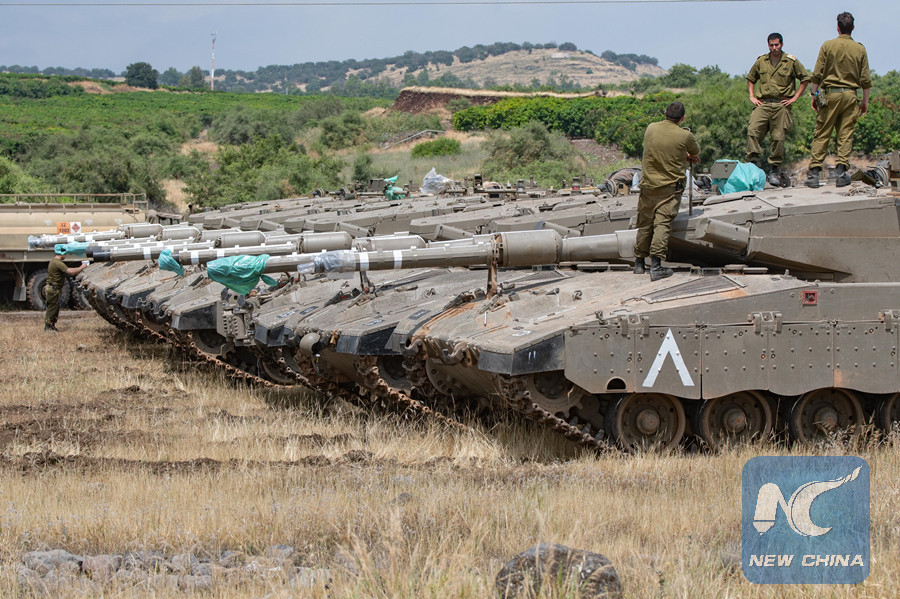
Israeli tanks are seen in the Israeli-occupied Golan Heights, on May 9, 2018. (Xinhua/JINI/Ayal Margolin)
JERUSALEM, May 10 (Xinhua) -- An Israeli military spokesperson said Thursday that the overnight Israeli airstrikes on Syria have set back Iran's military capabilities by "many months."
Israel's military said its air force struck "dozens" of military targets belonging to the Iranian al-Quds forces in Syria overnight between Wednesday and Thursday.
According to Brig. Gen. Ronen Manelis, a military spokesperson, the attack seriously damaged the Iranian forces in Syria. "It will take the al-Quds force months to recover from the Israeli strike," he said in an interview to the Hebrew-language Ynet news site.
Manelis said the airstrikes were carried out in retaliation for a barrage of rockets from Syria, but they were prepared in advance. "It took place as part of a pre-planned operation, based on solid intelligence and extremely high abilities of the Israel Air Force," Manelis said.
He said the attacks were "only the tip of the iceberg" of the army's capabilities.
"This strike is a message to everyone who seeks to harm us and undermine Israel and its sovereignty, especially in front of its citizens. The Israel Defense Forces are prepared for any scenario," he said.
According to Israel, about 20 rockets were fired at Israeli forces at around midnight in the annexed Golan Heights from Syria.
No Israelis were wounded. Israel blamed Iran's al-Quds forces.
A military statement said the Israeli attack targeted Iranian military sites in Syria, including Iranian intelligence sites, logistics headquarters belonging to al-Quds forces, a military logistics compound in al-Kiswah, south of Damascus, an Iranian military compound in north of Damascus, munition storage warehouses of al-Quds at the Damascus International Airport, intelligence systems and posts associated with al-Quds, observation and military posts and munition in the buffer zone.
In addition, the Iranian launcher from which the rockets were launched at Israel was also destroyed.
It was the largest military attack that Israel has carried out in Syria in the recent years.
The military said it "will not allow the Iranian threat to establish itself in Syria. The Syrian regime will be held accountable for everything happening in its territory."
Israel has been threatening for months that it will not allow an Iranian military presence in the territory of its northern war-torn neighbor.
Israel has been blamed for several recent deadly air attacks in Syria, which have killed Iranians. Israel did not officially acknowledge it was behind these attacks but it has been making preparations for possible Iranian retaliation for weeks.
In addition, during the eight-year war in Syria, Israel's military has responded to numerous spillovers of fire from the internal fighting near the disputed border in the Golan Heights by attacking Syrian President Bashar al-Assad's army positions.
U.S. President Donald Trump's withdrawal from the nuclear deal on Tuesday has sparked more tensions and fears over a possible Iranian response.

